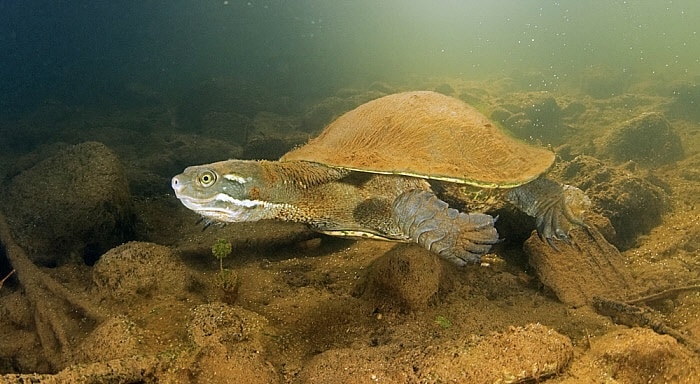Krefft’s River Turtles are a highly regarded species of short-necked freshwater turtle, endemic to eastern Queensland. They are the only known freshwater turtle species east of the Great Dividing Range that display distinct yellow facial stripes, which run from the eyes to the base of the head. This unique marking, paired with their calm and curious nature, makes them a standout choice for reptile enthusiasts looking for a long-term companion.
These turtles typically grow to around 250mm in shell length, with some individuals reaching up to 290mm in adulthood. Females are often larger than males, a common trait in many freshwater turtle species. In captivity, their lifespan can range significantly — while average lifespans are around 16 years, well-cared-for individuals in optimal environments have been known to live up to 50 years.
Krefft’s River Turtles are omnivores, requiring a balanced and varied diet. In the wild, they feed on a mix of aquatic vegetation, insects, worms, crustaceans, and small fish. In captivity, their diet should consist of:
- Live or frozen insects such as crickets and mealworms
- Quality turtle pellets
- Frozen turtle food
- Chopped vegetables and leafy greens
- Occasional protein sources like feeder fish or shrimp
At Toni’s Pet Station, we take great care to ensure that our captive-bred turtles are healthy, alert, and ready for their forever home. We only offer Krefft’s River Turtles to holders of a valid Class 1 Reptile Licence, as required under Queensland wildlife regulations.
These turtles require a well-maintained environment to thrive. A large aquarium or outdoor pond is essential, with clean, filtered water, UVB lighting, and a basking platform that allows the turtle to fully dry off. Maintaining water temperatures between 22–26°C is vital, and heating may be required depending on the season. UVB lighting should be provided 10–12 hours per day to support shell and bone health.
Young turtles, in particular, require attentive care. Their immune systems are still developing, and they are more susceptible to poor water conditions, inadequate lighting, and improper diet. We strongly advise new turtle owners to consult with our knowledgeable staff before purchase to ensure they are fully prepared for the responsibility of turtle ownership.
We also stock a full range of turtle care essentials, including:
- UVB and heat lamps
- Quality aquarium filtration systems
- Basking docks and enclosure decorations
- Reptile-safe water conditioners
- High-quality commercial turtle diets
Our staff are experienced in reptile care and are available to assist you in setting up or improving your turtle’s habitat. We’re here to make sure you’re confident and well-equipped to provide the best possible environment for your Krefft’s River Turtle.
Please note: Availability of live animals may vary. We recommend calling ahead to confirm stock and discuss suitability. Only available to customers with a current Class 1 Reptile Licence.
Key Features:
- Native to Queensland rivers and creeks
- Iconic yellow-striped facial markings
- Short-necked freshwater turtle species
- Females generally larger than males
- Omnivorous diet – insects, vegetation, and protein sources
- Hardy and adaptable with proper care
- Captive-bred for responsible pet ownership
- Lifespan of 16–50 years in captivity
- Legal requirement: Class 1 Reptile Licence
Suitable For:
- Licensed reptile owners seeking a freshwater turtle
- Experienced keepers looking for a long-term reptile companion
- Outdoor pond or large indoor aquarium setups
- Homes that can provide consistent heating, UVB, and clean water
Care Instructions:
To keep your Krefft’s River Turtle healthy, provide a large aquatic setup with a land basking area. Ensure the water is kept between 22–26°C, using an aquarium heater if needed. The basking platform should be dry and under a UVB heat lamp to support shell health and natural behaviours. Use a quality filtration system to maintain water clarity and reduce harmful ammonia levels. Feed a varied omnivorous diet, changing up proteins, vegetables, and turtle-specific pellets to meet nutritional needs.
Monitor your river turtle’s shell, appetite, and activity level regularly. Schedule annual check-ups with a reptile-experienced vet if possible. Perform water changes weekly, and test water quality regularly using reptile-safe kits.







